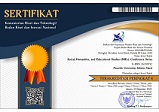Model Pengembangan Kompetensi Mahasiswa dalam Pengembangan Bahan Ajar Digital Pada Program Pendidikan Guru: Studi Kasus Mahasiswa Prodi Pendidikan Guru MI
Abstract
Social studies education is one of the compulsory subjects given to elementary school (SD) or Madrasah Ibtidaiyyah (MI) students which aims to form good citizens, so that its achievement is highly dependent on the quality of learning they receive in this case the use of teaching materials that suit the student's learning profile.The purpose of this study was to describe the model of student competency development in compiling digital teaching materials for social studies subjects. The approach used in this study is a qualitative approach with case studies. Data collection was carried out through observation, interviews and documentation studies. The results of the study showed that the student competency development model was carried out using democratic participatory techniques, and was differentiated. Students carried out self-development in compiling digital teaching materials through theoretical and practical reinforcement. So that students not only have theoretical knowledge but can also practice. The result is that students are able to develop digital teaching materials that are in accordance with the analysis of content needs and are interesting. The conclusion of the study shows that the competency development model accommodates the uniqueness of students so that the digital learning materials developed are able to adjust the demands of digital-based educational transformation that are interesting, effective and efficient according to the expected learning outcomes.
Pendidikan IPS adalah salah satu mata pelajaran wajib yang diberikan pada siswa usia Sekolah Dasar (SD) atau Madrasah Ibtidaiyyah (MI) yang bertujuan untuk membentuk warga Negara yang baik (good citizen), sehingga dalam pencapaiannya sangat bergantung pada kualitas pembelajaran yang diterimanya, dalam hal ini penggunaan bahan ajar yang sesuai profil belajar siswa. Tujuan penelitian ini adalah untuk mendeskripsikan model pengembangan kompetensi mahasiswa dalam penyusunan bahan ajar digital mata pelajaran IPS. Pendekatan yang digunakan dalam penelitian ini adalah pendekatan kualitatif dengan studi kasus. Pengumpulan data dilakukan melalui observasi, wawancara dan studi dokumentasi. Hasil penelitian menunjukkan bahwa model Pengembangan kompetensi mahasiswa dilakukan dengan teknik partisipatif demokratis, dan berdifferensiasi. Mahasiswa melakukan Pengembangan diri dalam penyusun bahan ajar digital melalui penguatan teoritis dan praktik. Sehingga mahasiswa tidak hanya memiliki pengetahuan teoritis namun juga bisa melakukan praktik. Hasilnya mahasiswa mampu mengembangkan bahan ajar digital yang sesuai dengan analisis kebutuhan konten dan menarik. Simpulan penelitian menunjukkan bahwa model pengembangan kompetensi mengakomodir keunikan mahasiswa sehingga bahan pembelajaran digital yang dikembangkan mampu menyesuaikan tuntutan dalam tranformasi pendidikan berbasis digital yang menarik, efektif dan efisien sesuai capaian pembelajaran yang diharapkan.
Keywords
Full Text:
PDFReferences
Branch, R. M. (2009). Instructional design: The ADDIE approach. Springer.
Carretero, S., Vuorikari, R., & Punie, Y. (2017). DigComp 2.1: The digital competence framework for citizens with eight proficiency levels and examples of use. Publications Office of the European Union.
Darmayanti, M.,& Amalia, A (2024). Bahan Ajar Digital dalam Pembelajaran di Sekolah Dasar. Analisis Bibliometrik dan Systematic Literature review. SITTAH: Journal of Primary Education, 5(1), 45-60.https://doi.org/10.30762/sittah.v5i1.2536
Fatimah, S., Trisnawati, O. R., Rinawati, A., Nurhidayah, N., & Fauziah, M. (2023). Analisis implementasi kurikulum merdeka di sekolah dasar inklusi. In Prosiding Seminar Internasional Peluang dan Tantangan Perguruan Tinggi di Era Industri 4.0 dan Society 5.0 (Vol. 1, No. 1, pp. 1-13).
Garrison, D. R., & Vaughan, N. D. (2008). Blended learning in higher education: Framework, principles, and guidelines. Jossey-Bass.
Johnson, D. W., & Johnson, R. T. (2009). An educational psychology success story: Social interdependence theory and cooperative learning. Educational Researcher, 38(5), 365-379.
Junita Fitriani, Hary Soedarto Harjono, & Rustam. (2025). Pengembangan Bahan Ajar Digital Berbasis Android dan Kompetensi Pembelajaran Abad 21 di Sekolah Menengah Pertama. Didaktika: Jurnal Kependidikan, 14(1 Februari), 283-294. https://doi.org/10.58230/27454312.1818
Koehler, M. J., & Mishra, P. (2009). What is technological pedagogical content knowledge? Contemporary Issues in Technology and Teacher Education, 9(1), 60-70.
Krajcik, J. S., & Blumenfeld, P. C. (2006). Project-based learning. In R. K. Sawyer (Ed.), The Cambridge handbook of the learning sciences (pp. 317-334). Cambridge University Press.
Lilis (2019). Pengembnagan Bahan Ajar digital Pada Mata pelajaran Dasar listrik dan elektronika Kelas X (The Development of Digital Teaching Materials In Electrical And Electronic Basic Learning Class X).https://jurnal.untirta.ac.id/index.php/JTPPm/article/viewFile/7423/5155Mayer, R. E. (2009). Multimedia learning (2nd ed.). Cambridge University Press.
Nurhidayah, Fikria Najitama, Endang Komara.(2024). Implementation of Differentiation Learning in Elementary School: Study of Participants in The Driving School Program. Seminar Nasional Inovasi Pendidikan Ke-7 (SNIP 2023) SHEs: Conference Series 6 (3) (2023) 364 – 372
Prensky, M. (2001). Digital natives, digital immigrants. On the Horizon, 9(5), 1-6.
Prasetyo, M. M., & Nurhidayah, N. (2021). The Effect of Internet Use on Improving Student Learning Outcomes. Journal of Education Technology, 5(4), 511–519. https://doi.org/10.23887/jet.v5i4.40748
Ridder, H.-G. (2014). Book Review: Qualitative Data Analysis. A Methods Sourcebook. German Journal of Human Resource Management, 28(4), 485-487. https://doi.org/10.1177/239700221402800402 (Original work published 2014)
Schön, D. A. (1983). The reflective practitioner: How professionals think in action. Basic Books.
Sholeh, M. I., Wahrudin, B., & Muzakki, H. (2024). Management Challenges in Implementing the Merdeka Curriculum. Al-Hayat: Journal of Islamic Education, 8(3), 1051-1071.
Tomlinson, Carol An. 2000. Differentiation of Instruction in the Elementary Grades https://eric.ed.gov/?id=ED443572
Vygotsky, L. S. (1978). Mind in society: The development of higher psychological processes. Harvard University Press.
Whitley, J., Duquette, C., Gooderham, S., Elliott, C., Orders, S. & Klan, A. (2021). Implementation of a Differentiated Instruction Initiative: Perspectives of Leaders. Canadian Journal of Educational Administration and Policy / Revue canadienne en administration et politique de l’éducation, (196), 49–64. https://doi.org/10.7202/1078517ar
Refbacks
- There are currently no refbacks.





